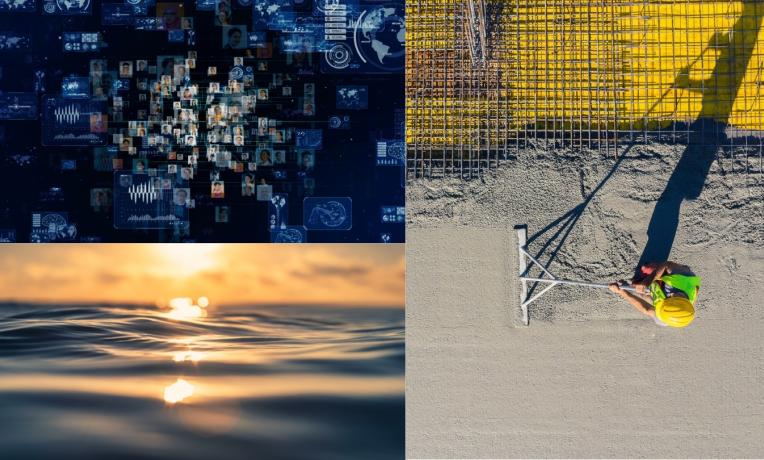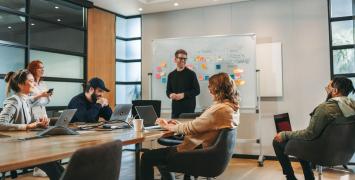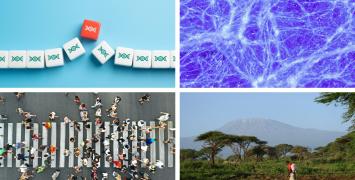Synergy Grants 2024: Examples of projects

Understanding the oceans’ nitrogen cycle and its impact on climate
Nitrogen is a vital nutrient for all forms of life. It plays a crucial role in marine photosynthesis and the ocean's ability to store carbon. This means that the availability of nitrogen directly affects both oceanic and terrestrial ecosystems. However, one significant issue is ocean deoxygenation, where certain areas of the ocean lose oxygen. Surprisingly, even though these low-oxygen areas make up only 0.1% of the ocean's volume, they account for about 30% of the total loss of nitrogen from the ocean due to tiny organisms known as microbes. Many of the key microbes and the controls on their activity are poorly understood.
To tackle this problem, a new project funded by an ERC Synergy Grant aims to create the first comprehensive global model of microbial ecosystems in oxygen-depleted marine environments. This model will help scientists predict how ongoing deoxygenation impacts nitrogen cycling, nitrogen loss, greenhouse gas emissions, and the overall carbon cycle.
Currently, there are significant gaps in our knowledge about the microbial communities that play a key role in transforming nitrogen. We need to understand the environmental factors that influence how these microbes thrive, die, and interact. Without this information, making accurate predictions is challenging. The project intends to bridge these knowledge gaps by combining oceanographic studies, biogeochemical research, and advanced models of microbial nitrogen transformations.
The research team includes four experts from Sweden, Denmark, Austria, and the USA. Laura Bristow from the University of Gothenburg is an expert on microbial nitrogen processes in low-oxygen zones. Bo Thamdrup from the University of Southern Denmark specialises in techniques for studying these environments. Katharina Kitzinger from the University of Vienna focuses on single-cell biology, and Emily Zakem from the Carnegie Institution for Science is an expert in modelling microbial ecosystems. Together, they aim to transform our understanding of nitrogen cycling in the oceans and its implications for climate change.

Project: RECLESS - Recycling versus loss in the marine nitrogen cycle: controls, feedbacks, and the impact of expanding low oxygen regions
Researchers:
- Bo Thamdrup, University of Southern Denmark, Denmark
- Laura A. Bristow, University of Gothenburg, Sweden
- Katharina Kitzinger, University of Vienna, Austria
- Emily Zakem, Carnegie Institution for Science, USA
ERC funding: €9.9 million over 72 months
Building durable and eco-efficient concrete infrastructure
Concrete is the most widely used artificial material in the world, forming the backbone of our transportation and energy infrastructure, without any viable alternative. However, two seemingly disconnected problems arise.
First, the essential ingredient of concrete - cement - is responsible for 8% of global anthropogenic CO2 emissions, making it crucial to develop eco-efficient alternatives. One approach is to replace part of the traditional cement with locally available supplementary cementitious materials that have a lower carbon footprint. However, this introduces new challenges, as these eco-efficient concretes will differ from traditional materials, with long-term performance still largely unknown. Second, we are witnessing the overly fast deterioration of concrete infrastructure exposed to cyclic loading, often leading to costly and potentially tragic consequences. This process is accelerated by the subversive effects of concrete fatigue, acting as a gray eminence behind the scenes.
A multidisciplinary team of experts - Thomas Matschei (cement chemistry), Bernhard Pichler (multiscale material science) Miroslav Vořechovský (probabilistic computational mechanics), and Rostislav Chudoba (structural concrete) - is coming together to establish the missing link between the material science of eco-efficient concretes and the fatigue life of key transportation and energy infrastructure.
The goal of this new Synergy Grant project is to decode the microstructural origins of concrete fatigue and to predict its impact on the structural lifespan. By formulating new theoretical concepts and combining them with innovative computer simulations and experimental protocols, the research team will underpin guidelines for designing durable structures with extended service life using the next generation of eco-efficient concretes, promoting their adoption in the construction sector.
Miroslav Vořechovský is a professor at the Institute of Structural Mechanics at Brno University of Technology in Czechia. Rostislav Chudoba and Thomas Matschei, both based in Germany, are professors at RWTH Aachen University. Bernhard Pichler is a professor at the TU Wien (Vienna University of Technology) in Austria.

Project: FATRESCON- Concrete matrices for high-cycle-fatigue resistant, eco-efficient infrastructure
Researchers:
- Miroslav Vořechovský, Brno University of Technology, Czech Republic
- Rostislav Chudoba, RWTH Aachen University, Germany
- Thomas Matschei, RWTH Aachen University, Germany
- Bernhard Pichler, TU Wien (Vienna University of Technology), Austria
ERC funding: €10 million over 72 months
How digital technology can help bring communities together
In today’s interconnected world, governments, social movements, and organisations are turning to digital democratic innovations to involve people in decision-making processes that affect them. A digital participation platform, for example, is an online tool or software designed to facilitate interaction among individuals or groups. It can be a website, an app, or a combination of both that enables people to engage, share ideas, make suggestions, vote on proposals, fill out surveys, and provide feedback on specific topics.
Four leading researchers – Umberto Grandi, Ulle Endriss, César Hidalgo, and Maija Setälä – are working together to strengthen the scientific basis of these platforms. Their interdisciplinary approach combines expertise in participatory platform design, deliberative democracy, and computational social choice.
Throughout the project, the team will design digital platforms that encourage participation and deliberation. They will test these platforms through randomised trials and analyse the results, advancing both the technology and our understanding of how citizens can better engage in decision-making on complex policy issues. By the end, they aim to demonstrate the potential of digital tools to enhance democratic practices. Additionally, they will deliver a suite of open-source tools, validated through scientific testing, to make these innovations accessible worldwide.
Umberto Grandi is a professor of computer science at Université Toulouse Capitole in France. Also in France, César Hidalgo is a professor of social and behavioural sciences at Toulouse School of Economics. Specialised in democratic theory, Maija Setälä is a professor of political science at the University of Turku, Finland. Based in the Netherlands, Ulle Endriss is a professor of artificial intelligence and collective decision-making at the University of Amsterdam.

Project: ADDI - Advancing digital democratic innovation
Researchers:
- Umberto Grandi, University Toulouse Capitole, France
- Ulle Endriss, University of Amsterdam, the Netherlands
- César Hidalgo, Toulouse School of Economics, France
- Maija Setälä, University of Turku, Finland
ERC funding: €9.9 million over 72 months





